|
|
|
Sort Order |
|
|
|
Items / Page
|
|
|
|
|
|
|
| Srl | Item |
| 1 |
ID:
178304
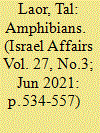

|
|
|
|
|
| Summary/Abstract |
Digital platforms have become a major tool for media figures. The Internet offers the media essential tools, most notably authentic and accessible sources of information and the absence of censorship. Digital media provides media personalities with a platform that is free and fast where they can express themselves freely without ‘gatekeepers.’ Drawing on Deuze’s five-dimensional model of journalism, this article shows that for the content transfer platform, the network is characterised by a young audience, leading to more consumer confidence due to its authentic nature. It also found that platform selection relates directly to content and that media people use the network to promote agendas. In addition, their influence on social networks is greater because they are bi-directional and allow for audience reaction. As for the media figure’s personality, it was found that the success of media figures does not involve the quality of the content but the admiration of the audience. In addition, it emerged from the interviews that technological determinism affects media figure activities such that ‘the medium is the message’ – type of media dictates choice of the content transfer platform, content, and media figure personality.
|
|
|
|
|
|
|
|
|
|
|
|
|
|
|
|
| 2 |
ID:
152024
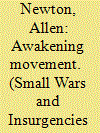

|
|
|
|
|
| Summary/Abstract |
This essay analyzes the link between mobilization and tribalism that developed in the Anbar Awakening. The Anbar Awakening exposed the Anbari tribal structure as a deeply entrenched and complex network deployed to mobilize support and generate behavior that would achieve the most advantageous strategy and position in a fight against al-Qaeda. Although this description supports David Kilcullen’s tribal society model, the rules of the Awakening movement that restored the tribal network were hardly explored by counter-insurgents for value and opportunity. The essay therefore draws on narratives from Anbari sheikhs to analyze the properties of tribalism (culture, identity, and problem-solving) as a non-linear social network, and demonstrates a paradigm in which mobilization of Anbari tribesmen is a valid indicator of security. The link between mobilization and tribalism in the Anbar Awakening therefore strategically develops to intervene in social life and address security locally.
|
|
|
|
|
|
|
|
|
|
|
|
|
|
|
|
| 3 |
ID:
088016
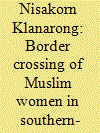

|
|
|
|
|
| Publication |
2009.
|
| Summary/Abstract |
In general, the main roles of married Thai Muslim women were as home makers good wives and good mothers. Nevertheless, both married and single women from rural areas have been increasingly obliged to work outside the household, locally and in other countries. People in rural areas are now faced with the difficulty of maintaining their livelihoods if they depended on agricultural production alone. In some instances, female migration might be a response to families not being able to survive on the incomes earned by the male household heads. In response, women in southern Thailand provinces use long-standing social networks that facilitate their migration for work, because they benefit from the close proximity, language, and religion that they share with the destination area. Commonly, they travel to work in Malaysia by using a border pass, while some travel and work without any documents. The effects of crossing national borders on migrants themselves and on their communities are mixed, generally positive from an economic perspective, but negative from a social viewpoint. Socially negative responses reflect a system of social control in the region based on patriarchy.
|
|
|
|
|
|
|
|
|
|
|
|
|
|
|
|
| 4 |
ID:
193192
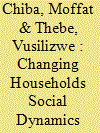

|
|
|
|
|
| Summary/Abstract |
This article explores household-level social dynamics of change and their causal effects on future agricultural practices and food security. It does this by employing a place-specific qualitative research methodology in two rural settlements in Shamva District, Mashonaland Central Province. It reveals how these changes have impacted negatively on farm households’ command of assets, including draft power, labour and social networks. Households that had a long history of agricultural excellence started to experience declines in their agriculture, while new households encountered new vulnerabilities. The article concludes by cautioning against any policy that ignores the household as a production unit in Zimbabwe’s agriculture.
|
|
|
|
|
|
|
|
|
|
|
|
|
|
|
|
| 5 |
ID:
175098
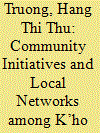

|
|
|
|
|
| Summary/Abstract |
Over the last two decades, coffee growers in Vietnam have faced the same problems as farmers all over the world. Ethnographic research among the community of K’ho Cil coffee growers in Lam Dong Province from 2016 to 2018 documented local initiatives to deal with the problems through the establishment of a K’ho Coffee network, revitalization of traditional production patterns, local integration into the global coffee commodity chain and agritourism entrepreneurship. Conceptualizing the way local K’ho Coffee growers generated and implemented the initiatives, this paper argues that by utilizing their social network, local farmers revitalized their economic production. Negotiating a decent collective position in the world system of the coffee commodity chain offers them a chance to survive the influx of economic deregulation and avert the impacts of climate change.
|
|
|
|
|
|
|
|
|
|
|
|
|
|
|
|
| 6 |
ID:
080985


|
|
|
|
|
| Publication |
2008.
|
| Summary/Abstract |
Societies are sometimes divided into groups that behave in different ways or have strongly opposing opinions. At other times, everyone seems to behave according to similar principles and opinions. It is likely that individual decisions on behavior or opinions are affected by social networks through influence and selection processes. However, the outcomes are not necessarily optimal for the society as a whole. Two types of problems might arise: (a) polarization of the society into two camps that do not reach consensus, possibly leading to conflict; (b) actors choosing suboptimal behavior, because changing behavior is too risky if done unilaterally. Simulations show that if a society is rather segregated initially, there exists a heightened probability that this situation will worsen. The effect of network density is twofold. First, density has a positive effect on reaching a uniform opinion and, therefore, decreases the likelihood of polarization. Second, density increases the likelihood that actors do not change their behavior, worsening the inefficiency of already suboptimal initial situations
|
|
|
|
|
|
|
|
|
|
|
|
|
|
|
|
| 7 |
ID:
119503


|
|
|
|
|
| Publication |
2013.
|
| Summary/Abstract |
There have been growing claims in media circles and law-enforcement settings that street gangs and criminal groups are turning to Internet-based social networking sites for various reasons ranging from the showcasing of their images and exploits to the suspected recruitment of members. The present study investigates whether such a trend is, in fact, in place. The presence of street gangs on these Internet sites is referred to as cyberbanging. While there is some anecdotal evidence suggesting that gangs are turning to social networking sites, there is little available research on exactly how street gangs and criminal groups use the Internet. Our main argument is that gang culture is in many ways an individualized phenomenon and this feature ties in directly with recent assessments of the Internet as a setting that is governed by a process of networked individualism. This theoretical link between the individualized gang setting and the presence of gang members on social networking sites helps us understand why recruitment is improbable even in a context where people are openly diffusing their image and exploits to a growing number of Internet users. The empirical segment of this research adds to this general outlook. Based on a keyword search of over 50 street gang names, the three main social networking sites (Twitter, Facebook, and MySpace) were monitored for street gang presence. Results illustrate that gang presence on social networking sites is linked primarily to promoting a general gang or street culture through individual displays. In regard to the visitors to such sites, there is no evidence that they are being tricked or manipulated in any way. They are, however, showing their curiosity in regard to such groups and, for those who share their comments and opinions, signs of support are evident. Thus, whereas criminal gangs are not proactively using the Internet to convert anyone into being gang members, social networking sites are creating a new venue for people who share or are sensitive to the values underlying street gang lifestyle to come together. These sites essentially create a new convergence setting for gang members to interact with a wider number of people who would probably never have been exposed to their lifestyles and exploits through physical interactions. The study's conclusion extends these findings toward further research in this area, as well as outlining the more relevant implications for law-enforcement monitoring of this growing phenomenon.
|
|
|
|
|
|
|
|
|
|
|
|
|
|
|
|
| 8 |
ID:
122517
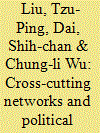

|
|
|
|
|
| Publication |
2013.
|
| Summary/Abstract |
This research examines whether public political participation in Taiwan is influenced by people's interactive relations and social environments. In contrast to the "sociodemographic factor" and "political mobilization" approaches used in previous studies of political participation, this paper's theoretical structure is that of "cross-cutting networks." It analyzes the influence exerted by social network "cross-pressures" on voters' engagement in political activities and their likelihood of voting in the 2010 mayoral elections in Taipei, Kaohsiung, and Taichung cities. The study uses national survey data to test the association between cross-cutting networks and political participation. The methodology adopted includes cross-tabulation analyses, ordered logit model, and logit model. The findings reveal that people in cross-cutting networks involving greater political disagreement are less likely to participate in politics while individuals engaging in homogeneous social interactions and under low-level cross-pressure are predisposed to participate more actively in politics.
|
|
|
|
|
|
|
|
|
|
|
|
|
|
|
|
| 9 |
ID:
188932
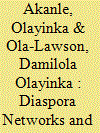

|
|
|
|
|
| Summary/Abstract |
Networks are important systems that impact multiple aspects of economic activities such as investments, businesses, innovation, and entrepreneurship skills. However, there is scant literature examining the crucial networks needed to inform diasporas’ decisions and oversee businesses/investments in their countries of origin. Using social network theory, the primary data for this article were gathered using in-depth interviews from 2019 to 2020. This is in addition to the authors’ primary insights over more than three decades into migration trajectories, diaspora existentialities, and investment domains in Nigeria. Findings suggest that some diasporas involve their networks such as family members and friends in their investment decision-making processes and eventual investments, while others have mistrust for their networks with implications for real investment choices and eventual outcomes. This article clearly shows that the diaspora networks within their investments’ thresholds, the roles of significant others, and the challenges of the diaspora are highly dynamic and ambivalent, as demonstrated through the Nigerian experience.
|
|
|
|
|
|
|
|
|
|
|
|
|
|
|
|
| 10 |
ID:
127944
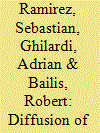

|
|
|
|
|
| Publication |
2014.
|
| Summary/Abstract |
ACM, Active Community Member, person that takes the initiative to fill out an application on behalf of a community; Seed, randomly selected ACM that allowed us to start collecting information; Ego, person that is interviewed. An Ego can also be an Alter, if it is mentioned by another Ego; Alter, people that provided (Type 1) or received (Type 2) information, as recalled by the Ego; Type 1 edge, an information flow in which an Alter provides information to an Ego; Type 2 edge, an information flow in which an Ego provides information to an Alter; Student, a person whose main occupation is to go to school; Radio, a message spread through the radio. Usually local stations in which an individual is interviewed; Internet, information about the stoves posted on Proyecto Mirador's Website; Maquila, a person that works at a factory for an international company, textile and food processing factories are usual; Agriculture, a peasant that works on agriculture, regardless of land tenancy; Health, a nurse, doctor or other health worker; Church, a priest, nun, minister or person who works as a minister of a faith; Education, a person who works as a school teacher or university professor; PM or PM associates, direct employees of Proyecto Mirador and its Implementers; Other NGO, a person that works on other non-governmental organizations. For example, Peace corps, Hivueras, Plan Honduras; Local, a local leader that has an appointment in the community but does not receive a monetary compensation. For example, members of the water board, village councils; Housewife, a woman whose main occupation is to keep the house; Business, a person that does commerce or services, includes people that sell food informally, artisans, masons, etc.; Government, a person who works directly for the government (except education and health practitioners); PM employees, direct employees without the implementers
|
|
|
|
|
|
|
|
|
|
|
|
|
|
|
|
| 11 |
ID:
143401
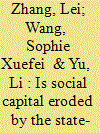

|
|
|
|
|
| Summary/Abstract |
In the rapid urbanization process, indigenous villagers' social capital might be affected by the flooding-in of rural migrants and more importantly by the government's urbanization policies. Based on survey data collected from fifteen Beijing villages in 2011 and 2012, we study the relationship between social capital and urbanization for indigenous villagers in the urban fringe of Beijing. We find that the bottom-up urbanization measured by migrant-local ratio weakened social networks and social trust. However, the top-down urbanization measured by designating policy zone promoted social networks and social trust.
|
|
|
|
|
|
|
|
|
|
|
|
|
|
|
|
| 12 |
ID:
129961


|
|
|
|
|
| Publication |
2014.
|
| Summary/Abstract |
This paper describes results from a network survey of Nain - a predominantly Inuit community of ~1200 people located on the northern coast of Labrador. As part of a larger social network research project, we used peer-referral sampling to recruit 330 residents for interviews about food sharing, housing, public health and community traditions. The peer-referral chains were analysed statistically to determine the presence and absence of social divisions in the community. The results of these analyses show that ethnic identification, relocation status and household income were the most significant social divisions in the community, while gender, education level and employment status show little or no effect on patterns of between-group interconnection. We argue that statistical patterns in the presence (and absence) of intergroup links offer novel ways to examine the interrelationship between recent economic development and the historical disruptions caused by Inuit community relocations in the 1950s.
|
|
|
|
|
|
|
|
|
|
|
|
|
|
|
|
| 13 |
ID:
127788
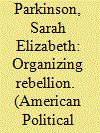

|
|
|
|
|
| Publication |
2014.
|
| Summary/Abstract |
Research on violent mobilization broadly emphasizes who joins rebellions and why, but neglects to explain the timing or nature of participation. Support and logistical apparatuses play critical roles in sustaining armed conflict, but scholars have not explained role differentiation within militant organizations or accounted for the structures, processes, and practices that produce discrete categories of fighters, soldiers, and staff. Extant theories consequently conflate mobilization and participation in rebel organizations with frontline combat. This article argues that, to understand wartime mobilization and organizational resilience, scholars must situate militants in their organizational and social context. By tracing the emergence and evolution of female-dominated clandestine supply, financial, and information networks in 1980s Lebanon, it demonstrates that mobilization pathways and organizational subdivisions emerge from the systematic overlap between formal militant hierarchies and quotidian social networks. In doing so, this article elucidates the nuanced relationship between social structure, militant organizations, and sustained rebellion.
|
|
|
|
|
|
|
|
|
|
|
|
|
|
|
|
| 14 |
ID:
133944
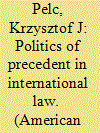

|
|
|
|
|
| Publication |
2014.
|
| Summary/Abstract |
The concept of precedent is fundamental to domestic courts, especially in Anglo-American common law systems, where judges are bound to the court's past decisions. By contrast, precedent has no formal authority in international law. Legal scholars point to Article 59 of the International Court of Justice (ICJ) Statute in this respect, according to which international legal rulings are binding only on the parties in the dispute at hand, and have no bearing on matters outside of the case.
|
|
|
|
|
|
|
|
|
|
|
|
|
|
|
|
| 15 |
ID:
068731


|
|
|
| 16 |
ID:
124639
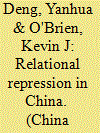

|
|
|
|
|
| Publication |
2013.
|
| Summary/Abstract |
Chinese local officials frequently employ relational repression to demobilize protesters. When popular action occurs, they investigate activists' social ties, locate individuals who might be willing to help stop the protest, assemble a work team and dispatch it to conduct thought work. Work team members are then expected to use their personal influence to persuade relatives, friends and fellow townspeople to stand down. Those who fail are subject to punishment, including suspension of salary, removal from office and prosecution. Relational repression sometimes works. When local authorities have considerable say over work team members and bonds with protesters are strong, relational repression can help demobilize protesters and halt popular action. Even if relational repression does not end a protest entirely, it can limit its length and scope by reducing tension at times of high strain and providing a channel for negotiation. Often, however, as in a 2005 environmental protest in Zhejiang, insufficiently tight ties and limited concern about consequences creates a commitment deficit, partly because thought workers recognize their ineffectiveness with many protesters and partly because they anticipate little or no punishment for failing to demobilize anyone other than a close relative. The practice and effectiveness of relational, "soft" repression in China casts light on how social ties can demobilize as well as mobilize contention and ways in which state and social power can be combined to serve state ends.
|
|
|
|
|
|
|
|
|
|
|
|
|
|
|
|
| 17 |
ID:
124606
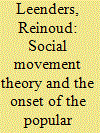

|
|
|
|
|
| Publication |
2013.
|
| Summary/Abstract |
This article takes stock of my attempt to scrutinize the onset of the Syrian uprising with the help of some key analytical concepts derived from social movement theory, including "opportunity" and "threat," "social networks," "repertoires of contention," "framing," and "diffusion." These tools allow me to identify and disentangle the mechanisms of early mobilization and the uprising and explain why they commenced in relatively peripheral areas. Social networks and framing processes are argued to have been key in mobilization, by transmitting opportunities derived from the "Arab Spring," by mediating the nexus between repression and mobilization, by creating and feeding a rich new repertoire of defiant protest acts and claims-making, and by aiding the diffusion or agglomeration of mobilization throughout the country.
|
|
|
|
|
|
|
|
|
|
|
|
|
|
|
|
| 18 |
ID:
102066
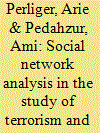

|
|
|
| 19 |
ID:
079204
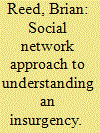

|
|
|
| 20 |
ID:
143395
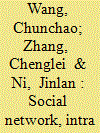

|
|
|
|
|
| Summary/Abstract |
This study examines the determinants of rural–urban migrant wages, paying special attention to the intra-network education spillover effect of the migrants' social network in China. Using the new migrant sample of Rural Urban Migration in China (RUMiC) 2009 survey data, we find that the migrants' social network does have a significant impact on their own earnings. In particular, we find evidence that there exists an education spillover effect of the migrants' social network, which indicates that the education level of the migrants' social network has a significant positive effect on their earnings. We also find that the education spillover effects differ with gender. The results are robust after considering the potential problem of endogeneity.
|
|
|
|
|
|
|
|
|
|
|
|
|
|
|
|
|
|
|
|
|